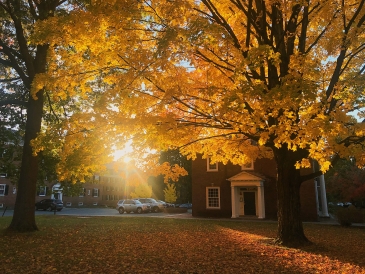

Sydney Wuu


A Peek into a Freshman's Fall Classes
The Price System: Analysis, Problems, Policies
Having never taken an economics class prior to Dartmouth, I took Economics 1 this fall to explore how people make decisions and how to think like an economist. We just wrapped up our first midterm that covered topics like supply and demand, taxes and subsidies, elasticities, and marginal utility. Now, we're jumping into graphing indifference curves and analyzing competitive firms in the short and long terms. As part of our problem sets, we have been listening and responding to a variety of NPR podcasts on topics relevant to our everyday lives – how costumes relate to international tariffs, almond trees and opportunity cost, Uber's controversial surge pricing, and more. During our weekly discussion meetings, Professor Shenhav is especially helpful in answering all of our questions and popping into breakout rooms to assist. I've also joined a weekly study group (which is free with the Tutor Clearinghouse at Dartmouth!) and have enjoyed discussing concepts with a small group of peers and our upperclassman tutor Anoop to guide us.
Introduction to Education: Learning, Development, and Teaching
I am absolutely loving Education 1 – an interdisciplinary asynchronous class housed in the Education department. I'm learning so much about the significance of early pre-K interventions on long-term behaviors, the layered complexities of the American public school system, the neuroscience behind how the brain processes new information, and more! Since this class is asynchronous, I can go at my own pace when writing up discussion posts and collaborating on group projects. I usually watch the lectures the day they are posted on Tuesdays and Thursdays at Novack, the student cafe on campus. Professor Tine goes above and beyond to provide thorough feedback on all assignments and loves when her students pop into Zoom office hours. Her passion about teaching, especially when it comes to reversing neuromyths and alleviating educational inequities in the United States, inspires me to truly engage with class material!
Introduction to International Development
International Studies 16 is a fantastic course within the Geography department that hones in on the roots of global inequality. So far, we've learned about topics like colonial history, the global South, the Green Revolution, the work of the World Bank, racial capitalism, and international aid. Not going to lie, this class does cover a dense reading load, but we also mix things up by watching documentaries, learning about current news items, listening to guest speakers, and participating in engaging discussions. Today, I just finished an in-class debate on cash transfers versus traditional aid, a hot relevant development topic. We also have an online research journal where we can examine any one of the Sustainable Development Goals that piques our interest – I am writing about initiatives to improve public transportation within the Philippines. Professor Freidberg and my teacher assistant Han are super knowledgeable and always willing to schedule office hour appointments. I took this class on a whim after emailing the professor about additional openings, and I'm so glad I've been able to explore international development my freshman fall!
Posts You Might Like

My experience in my first ever literature class!


What are the first five words you think of when you hear the words Mafia? (In italiano per favore)


All about Writing 5 (and my favorite watches from the course materials!)


During my sophomore spring quarter, I took on the challenge of four STEM courses, and while it has been intense, the unexpected connections across subjects and the joy of learning have made it one of my most rewarding academic experiences yet.


Hello finals week! As I close out a finals season, dive into my bag to see just what gets me through this time of the term!


On the Beijing LSA+, we have real-world Chinese practice every Friday. Last week we went to two neighborhoods, Houhai and Shichahai, and wrote a photo log about our experience. Read along to see what immersive language learning here looks like!


Curious about what a class looks like on a Dartmouth Foreign Study program? Read on!


With so many undergraduates hoping to participate in the exceptional atmosphere of the Tuck School of Business, Tuck created programs specifically designed for us. I was fortunate enough to take part in one of them: TuckLAB Entrepreneurship.

